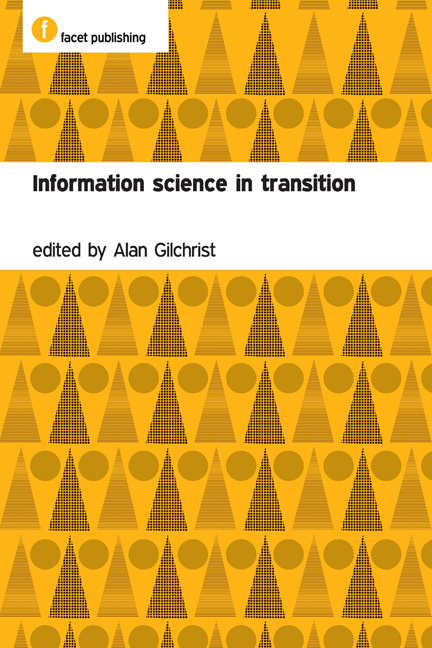Book contents
- Frontmatter
- Contents
- Contributors
- Preface
- Editorial
- Guest Editorial: Meeting the challenge
- 1 Fifty years of UK research in information science
- 2 Smoother pebbles and the shoulders of giants: the developing foundations of information science
- 3 The last 50 years of knowledge organization: a journey through my personal archives
- 4 On the history of evaluation in IR
- 5 The information user: past, present and future
- 6 The sociological turn in information science
- 7 From chemical documentation to chemoinformatics: 50 years of chemical information science
- 8 Health informatics: current issues and challenges
- 9 Social informatics and sociotechnical research – a view from the UK
- 10 The evolution of visual information retrieval
- 11 Information policies: yesterday, today, tomorrow
- 12 The disparity in professional qualifications and progress in information handling: a European perspective
- 13 Electronic scholarly publishing and Open Access
- 14 Social software: fun and games, or business tools?
- 15 Bibliometrics to webometrics
- 16 How I learned to love the Brits
- Index
16 - How I learned to love the Brits
Published online by Cambridge University Press: 08 June 2018
- Frontmatter
- Contents
- Contributors
- Preface
- Editorial
- Guest Editorial: Meeting the challenge
- 1 Fifty years of UK research in information science
- 2 Smoother pebbles and the shoulders of giants: the developing foundations of information science
- 3 The last 50 years of knowledge organization: a journey through my personal archives
- 4 On the history of evaluation in IR
- 5 The information user: past, present and future
- 6 The sociological turn in information science
- 7 From chemical documentation to chemoinformatics: 50 years of chemical information science
- 8 Health informatics: current issues and challenges
- 9 Social informatics and sociotechnical research – a view from the UK
- 10 The evolution of visual information retrieval
- 11 Information policies: yesterday, today, tomorrow
- 12 The disparity in professional qualifications and progress in information handling: a European perspective
- 13 Electronic scholarly publishing and Open Access
- 14 Social software: fun and games, or business tools?
- 15 Bibliometrics to webometrics
- 16 How I learned to love the Brits
- Index
Summary
As a child I grew up in awe of an English accent. That was not unusual for an American because so many movie stars spoke with an English accent. All during my high school and college days I instinctively believed that anyone who spoke with an Oxford or BBC accent was an authority. And I even held professors and intellectuals who adopted the Harvard version of an English accent in awe. Several of my professors at Columbia University deserved that sort of adulation since they were indeed experts in their respective fields. However, that all changed when I reached Johns Hopkins University in 1951, when I audited a course in statistics with Professor W.G. Cochran. The student who sat next to me was a Brit who spoke with great authority but after a few weeks I began to realize that most of what he said was nonsense.
For the next few years I had little contact with Englishmen during my stay at Johns Hopkins but my boss at the Welch Medical Library Indexing Project reminded me regularly that he had studied Elizabethan medicine at Oxford.
My next encounter with the English occurred after leaving the Welch Project. I was impressed by the performance of the editor of the Journal of Documentation, who stood up to the harassment from my then former boss. He was angry at me for submitting a paper to the Journal of Documentation without his permission. So much so that he asked the attorney for the university to write a ‘cease and desist’ letter but the editor did not buckle to his threats. So I can honestly say that my first published paper appeared in an English publication [1]. These stressful events occurred while I was enrolled at Columbia University School of Library Service.
Of course, even during my two years in Baltimore the British influence on my career was felt strongly. My ‘bible’, so to speak, at that time was the onevolume, 700+page Proceedings of the 1948 Royal Society Scientific Information Conference [2]. I mentioned the key role played by John Desmond Bernal in that meeting when I spoke about his impact on science policy studies and the field of information science at the recent symposium held at University College in Dublin in September 2007 [3].
- Type
- Chapter
- Information
- Information Science in Transition , pp. 377 - 383Publisher: FacetPrint publication year: 2009



